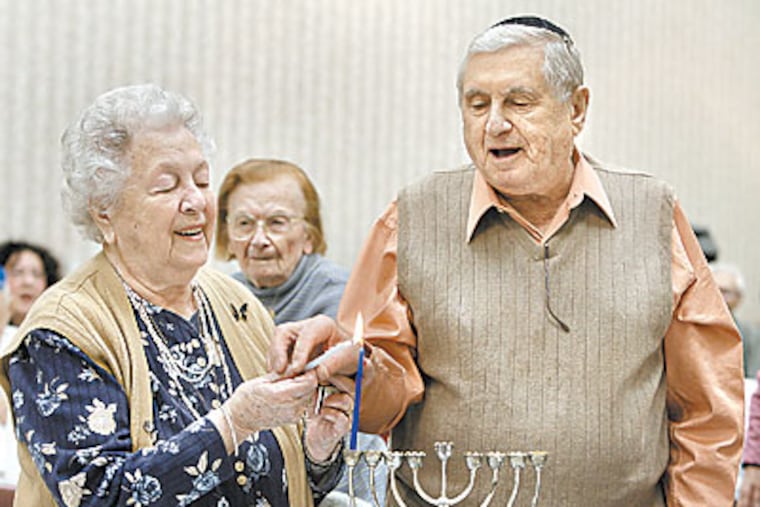A triumph of light - and of life
As a little boy in Czechoslovakia, Emil Paul got pennies - gelt - for Hanukkah. Growing up in Romania, Lili Goldener got gifts of sleds and scarves and coats each day of the holiday.

As a little boy in Czechoslovakia, Emil Paul got pennies - gelt - for Hanukkah.
Growing up in Romania, Lili Goldener got gifts of sleds and scarves and coats each day of the holiday.
And for her "crime" of being Jewish, the Nazis sent Goldener to the Auschwitz concentration camp in Poland. They sent Paul to the Mauthausen labor camp in Austria.
Their parents and 10 of their 18 siblings perished in Nazi camps. But Emil and Lili survived, and with them their faith traditions endure.
They met playing soccer in an Italian refugee camp, later married, and on Thursday were among the 35 Holocaust survivors who gathered at the Jewish Federation's community center in Cherry Hill to celebrate Hanukkah, albeit a few days early.
Hanukkah, the Festival of Lights, begins today at sundown. Jews around the world will mark each new day of the eight-day festival by lighting one more candle in a traditional nine-branch candelabrum known as the hanukkiah or menorah.
For 10 years the Pauls, who live in Marlton, and the others have been meeting monthly at the federation's Katz Center for "Cafe Europa," a social network for Holocaust survivors, where they sing, have lunch, celebrate birthdays, show photos of the grandchildren, and celebrate important holidays together.
This year it was 84-year-old Emil Paul's turn to light the inaugural Hanukkah candle.
Shortly past noon the chatting at the tables fell silent, and everyone turned to face the front of the room, where Paul, wearing a skullcap, stood before a silver-plate hanukkiah.
"Barukh atta adonai, eloheynu melekh ha-olam . . .," he sang out, reciting the Hebrew prayer that praises the "king of the universe," who has "commanded us to kindle the lights of Hanukkah," just as Paul and his brothers and sisters did eight decades ago.
Moments later, with his 80-year-old wife at his side, he touched the blue starter candle, or shamash, to a lighted match and, with a trembling hand, touched the shamash to the solitary candle in the candelabrum.
As he struggled to return the shamash to its place in the center of the candelabrum, Lili Paul reached out her hand to steady his, and they put it in place together.
The lighting ceremony was followed by a buoyant celebration in song of the story of the first Hanukkah, when Jews rebelled against the local monarch's order to erect a statue of Zeus in the Temple of Jerusalem.
Jewish forces defeated the monarch's army in 165 B.C. and reclaimed the temple. According to tradition, a one-day supply of purified oil in the temple lamps miraculously lasted eight days.
"OK, let's sing out nice and loud," keyboardist Claire Zelman called out to the Europa Cafe crowd, and led them in "Hevenu Shalom Alechem," followed by "Ikh Bin a Kleyner Dreydl" ("I Had a Little Dreidel"), then "Maoz Tzur" ("Rock of Ages") in Hebrew and English, and "Oy, Hanukkah."
"That's about a 150-year-old song from Poland," said Zelman. "I thought you might enjoy it."
Cafe Europa is sponsored by the Jewish Family and Children's Service of Southern New Jersey and the New York-based Claims Conference, which provides services to Holocaust survivors.
Over lunch of turkey pastrami on rye, potato latkes, and apple cake, Charlotte Weiss of Voorhees (and a great-grandmother) recalled how she and all four of her sisters survived Auschwitz by pleading with the camp's notorious medical director, Josef Mengele, to send them to a labor camp.
As children they had belonged to a poor farm family in Czechoslovakia, Weiss said, and "we didn't get toys" for Hanukkah "because there was no place to buy them."
"So we sang songs - mostly in Yiddish - lit the menorah, had a big meal, and were happy we were together."
Harold Bratt, 87, of Cherry Hill, remembered getting Hanukkah gelt in Poland back "when a penny was money."
And Judith Swimmer, 81, of Atco, spoke fondly of the Hanukkahs her family celebrated in Krakow, Poland.
"There were Hebrew schools in Krakow," she recalled, "and at Hanukkah the classes would walk down the sidewalks in the Jewish neighborhoods singing songs."
She endured seven concentration camps, she said, by recalling the music - "opera, Beethoven" - and poetry she learned as a youngster.
After lunch, the program staff handed out Hanukkah cards and bags with simple gifts: Erna Anolik of Cherry Hill got an umbrella. Her friend Lisa Van Dyke of Marlton got a Hanukkah candy dish.
Hanukkah in Eastern Europe was "very different from here" in the United States, said Lili Paul. "There was no such thing as toys. You got things you needed, like a scarf."
But for her husband even new clothing was a rarity. Hanukkah, he said, was not about gifts but family and tradition.
"My father would make a prayer," Emil Paul recalled, "and then the oldest [child] would light the first candle, and the second oldest would light the next, and so on. . . . It was a beautiful thing."
Around 1:30 p.m. the crowd began to thin as members departed, gift in hand, to meet their rides home. Most turned as they exited the room with a wave, or a hoist of a cane, and called out, "Happy Hanukkah." The others responded with the same farewell until, one by one, they all were gone.
"Each of them is a miracle," said Helen Kirschbaum, education director for the center's Goodwin Holocaust Museum. "They're all miracles."